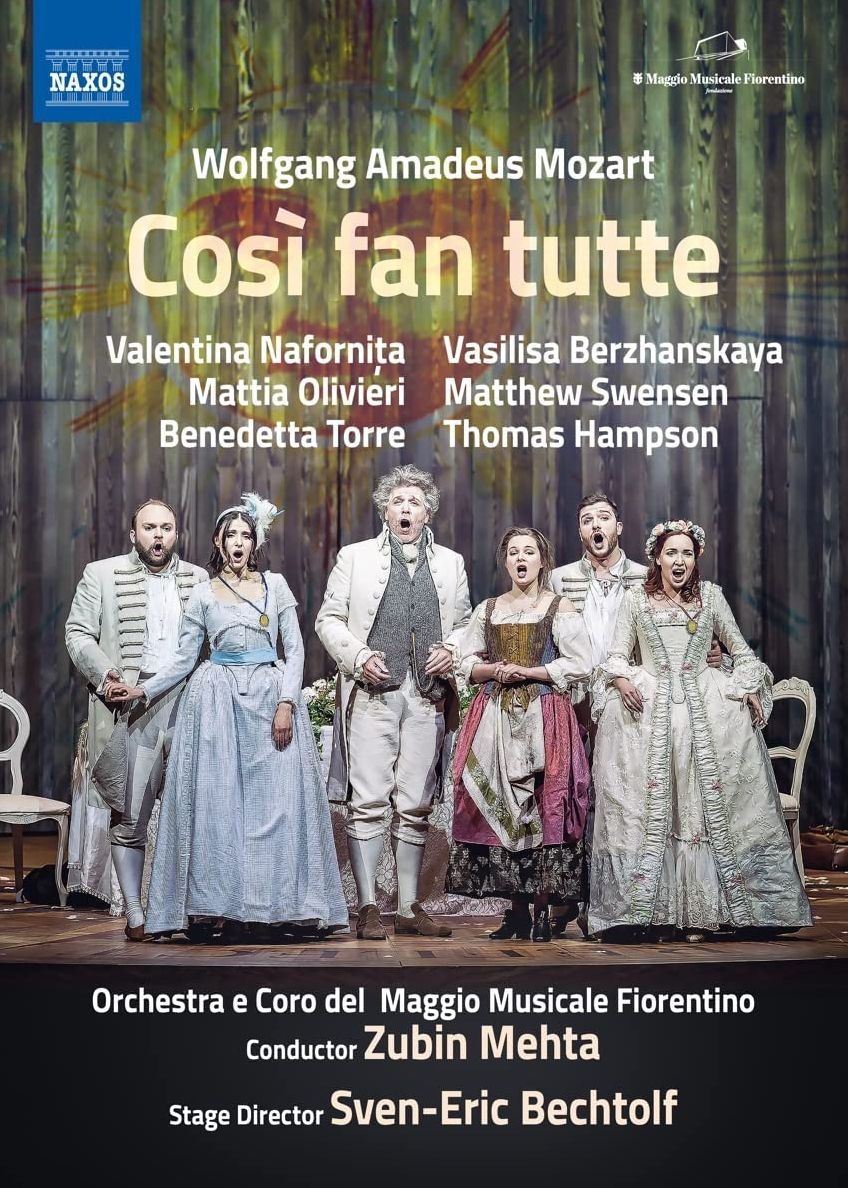MOZART Così fan tutte (Mehta)
View record and artist detailsRecord and Artist Details
Genre:
Opera
Label: Naxos
Magazine Review Date: 06/2022
Media Format: Digital Versatile Disc
Media Runtime: 188
Mastering:
DDD
Catalogue Number: 2 110726

Tracks:
| Composition | Artist Credit |
|---|---|
| Così fan tutte |
Wolfgang Amadeus Mozart, Composer
Benedetta Torre, Despina, Soprano Florence Maggio Musicale Chorus Florence Maggio Musicale Orchestra Matthew Swensen, Ferrando, Tenor Mattia Olivieri, Guglielmo, Baritone Thomas Hampson, Don Alfonso, Baritone Valentina Naforniţa, Fiordiligi, Soprano Vasilisa Berzhanskaya, Dorabella, Mezzo soprano Zubin Mehta, Conductor |
Author: Richard Lawrence
Two productions of Così fan tutte by Sven-Eric Bechtolf have already appeared on DVD: from Zurich, conducted by Franz Welser-Möst (Arthaus Musik, 12/10), and from the Salzburg Festival, with the Vienna Philharmonic under Christoph Eschenbach (EuroArts, 10/15). I haven’t seen the former; the Salzburg staging was beautifully acted and sung by its mainly young cast but Bechtolf chose to ignore the fact that this is a comedy – albeit, like its two da Ponte predecessors, a serious one – and the unsatisfactory ending included the death by poison of Don Alfonso. In Zurich, according to Richard Wigmore’s review, it’s Fiordiligi who takes arsenic. Weird, or what?
This new production from Florence, given without a public audience, is less solemn; but, as we shall see, Bechtolf still gets the ending wrong. The set by Julian Crouch features two parallel staircases and a round, patterned floor. A ship arrives to take the officers away and a townscape is visible during the Act 2 garden scene, but we are still a long way from Beecham’s ‘long summer day spent in a cloudless land by a Southern sea’, quoted by RW in his review. Keith Pollard’s 18th-century costumes are easy on the eye.
As at Salzburg, there is much eavesdropping. Fiordiligi, unseen, listens to Ferrando singing ‘Un’aura amorosa’: a nice touch, suggesting that – despite having just stormed up and down the scale in ‘Come scoglio’ – she is already beginning to find him desirable. She also witnesses the last part of ‘Il core vi dono’, where Guglielmo is seducing Dorabella; while Don Alfonso observes the sisters’ conversation after Despina’s ‘Una donna a quindici anni’.
The opening credits and the Overture show Don Alfonso as puppet-master: not with puppets but with a demonstration of projected hand shadows for the benefit of the local peasantry. The camera lingers on a set of cogs at the foot of the staircases. The officers enter – this is no café, though drinks do appear in the last of the three terzettos – and mime bafflement at the books they find in Alfonso’s Gladstone bag: perhaps works by writers of the Enlightenment such as Rousseau or Voltaire. After that, the action moves ahead briskly, with no delays for changes of scene.
Two things will trouble fellow pedants. When the officers return disguised as Albanians, their clothes are different but their appearance is not. It’s impossible to believe that the girls would be fooled. (There is no suggestion, fortunately, that they know what is going on and decide to play along.) And then, ah yes, the ending. There’s an amusing running gag when Alfonso, by gesture or inclination of the head, prevents the officers (in whatever guise) from addressing the wrong sister. Come the moral – ‘Happy is the man who … lets himself be guided by reason’ – the cast sing from the book that Alfonso is holding. Order has been restored and the couples are back in their original relationships. But then the officers change places: they embrace their new loves and Alfonso repeats the semi-humorous shrug that marked the end of the Overture. Amusing, but wrong, though the synopsis in the booklet gets it right. Still, nobody drops dead.
The cast are excellent. Valentina Naforniţa, seeming to pray as she puts flowers round a candle, is deeply moving as she expresses Fiordiligi’s anguish in ‘Per pietà’. Vasilisa Berzhanskaya is billed as a mezzo but she sounds, correctly, more like a soprano. ‘Smanie implacabili’, taken very fast, shows that Dorabella, the flightier of the sisters, has a formidable side. Benedetta Torre, vivacious without overdoing it, is perfect casting for the maid, Despina. Matthew Swensen is not the most honeyed of Mozart tenors but he comes across well as the sentimental Ferrando. Before the more genial Guglielmo gets his comeuppance, he sings ‘Donne mie’: Mattia Olivieri pitches it well, with some byplay involving an orange, a melon, apples and a pumpkin (don’t ask). Thomas Hampson, 65 at the time, sounds a little rusty, but he is an experienced trouper and there is no faulting his stage presence and sense of timing.
In the pit, Zubin Mehta is very ‘old school’: a slow introduction to the Overture, definitely four-in-a-bar, not two, and rallentandos in the last sung phrase of some of the arias. But on the whole he keeps things moving along nicely and the orchestra sparkles. As for textual matters: as usual, Ferrando’s ‘Ah, lo veggio’ is omitted, and there are cuts in the secco recitative, but the duettino for the officers is retained. A bar has gone AWOL after the canon in the Act 2 finale. Not a top choice, but this lively production, well filmed by Tiziano Mancini, is certainly worth investigating.
Discover the world's largest classical music catalogue with Presto Music.

Gramophone Digital Club
- Digital Edition
- Digital Archive
- Reviews Database
- Full website access
From £8.75 / month
Subscribe
Gramophone Full Club
- Print Edition
- Digital Edition
- Digital Archive
- Reviews Database
- Full website access
From £11.00 / month
Subscribe
If you are a library, university or other organisation that would be interested in an institutional subscription to Gramophone please click here for further information.




